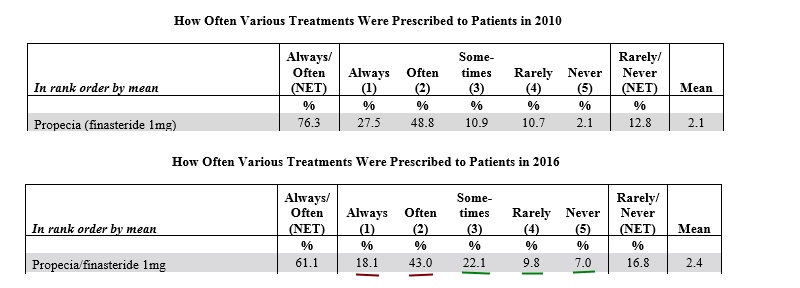Last Updated on April 29, 2020 by Robert Price
So I was just reviewing the results of the 2016 ISHRS (International Society of Hair Restoration Surgeons) physician survey. They do a survey every year, or at least most years. These surveys cover a variety of topics, from which medications their members prescribe most, to the latest trends in the industry, to technological advances, and more.
As I reviewed the results, one statistic stood out above all the others: In 2017, 16.9% of ISHRS respondents either rarely or never prescribed Propecia to their patients.
I went back and reviewed results from previous years, and as I expected, that was the highest percentage of physicians ever to advise against the use of the controversial medication, as far I can tell. In 2010, that number was 12.8%. Back in 2005, only 8% of ISHRS respondents either rarely or never prescribed the medication.
So, there’s been something of a downward trend in terms of overall prescriptions being written for Propecia. That much is clear.
Below is a chart that compares the ISHRS survey statistics from 2009 to 2016.
2010 & 2016 ISHRS Survey Results on Propecia

Credit: ISHRS. Results from both surveys are available online. The green underlines represent net percentage increases from 2010 to 2016. The red underlines represent net percentage decreases from the same time period.
As you can see, overall, doctors who responded to this survey were much less likely to prescribe Propecia in 2017 vs. 2010. The significant increase in doctors who only prescribe the medication “sometimes” is another revealing statistic, perhaps indicating that doctors are more cautious about advising their patients to use the medication.
Why Propecia is Losing Popularity
There are a number of reasons physicians are less inclined to prescribe Propecia, in my view. Those reasons include:
- Safety Concerns – I’ve seen numerous doctors voice their concerns about Propecia’s safety profile on websites, online forums such as RealSelf, etc.
- Fear of Being Sued – Personal Injury Attorneys across the country are salivating at the prospect of suing Merk, the manufacturer of Propecia. Here in America, a lawsuit-happy nation, doctors who prescribe Propecia could also face legal ramifications for prescribing the drug, if they do so in a negligent fashion.
- Less Men Want to Take It – This is probably also a factor in Propecia’s decline in popularity. A high percentage of men don’t want to take it under any circumstances, which could in turn make doctors more leery of prescribing it.
- More Alternatives Available – Though no hair loss treatment comes close to matching Propecia’s efficacy, there are many options out there that can slow down the balding process. Laser therapy, minoxidil, and PRP are three such treatments. Even natural remedies, like pumpkin seed oil, rosemary oil, and saw palmetto, have shown promise as effective, safe, treatments for hair loss. Many men opt to combine therapies, in order to maximize their hair-growth prospects.
Will the Downward Trend Continue?
Propecia is still regarded as the most effective treatment for hair loss. But given the rise of post-finasteride syndrome cases, alternatives to Propecia, and the fact that it’s simply not a very appealing option for many men, I believe the drug’s popularity among prescribers and patients alike will continue to diminish over the next decade. It could even be phased out completely, provided that the next (long-overdue) breakthrough arrives and becomes available to the masses. Here’s to hoping.
Robert Price is a writer, consumer advocate, and hair loss researcher with thousands of hours of experience in the field. His goal is to keep you out of the hair loss rabbit hole, underworld, or whatever you want to call it. He founded Hair Loss Daily, the unbiased hair loss blog, in 2016. You can learn more about Robert in the my story section of this website.

